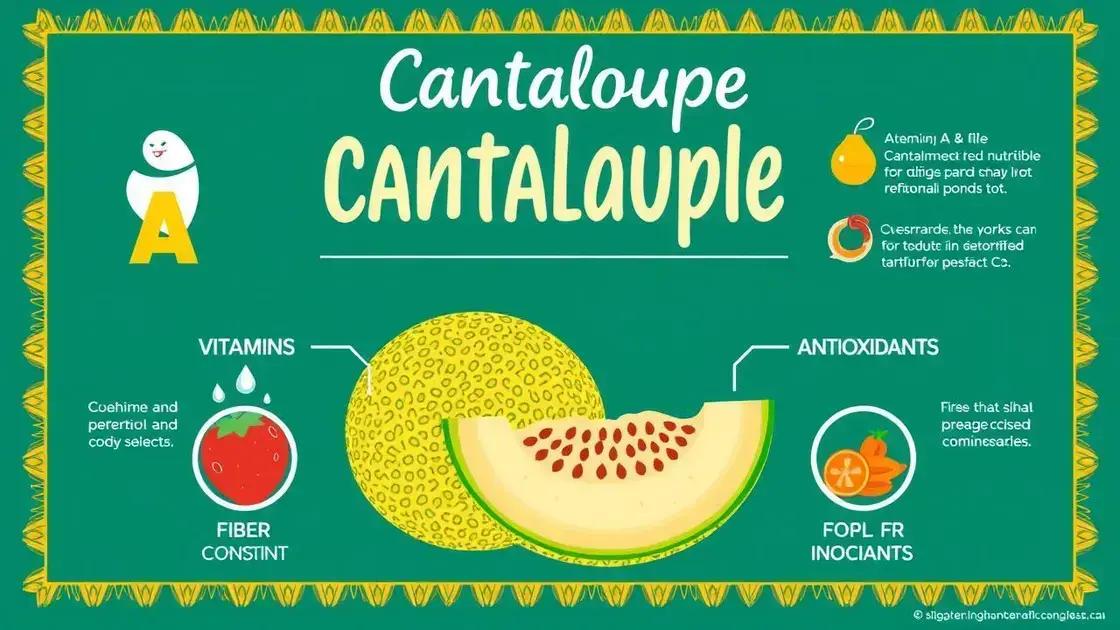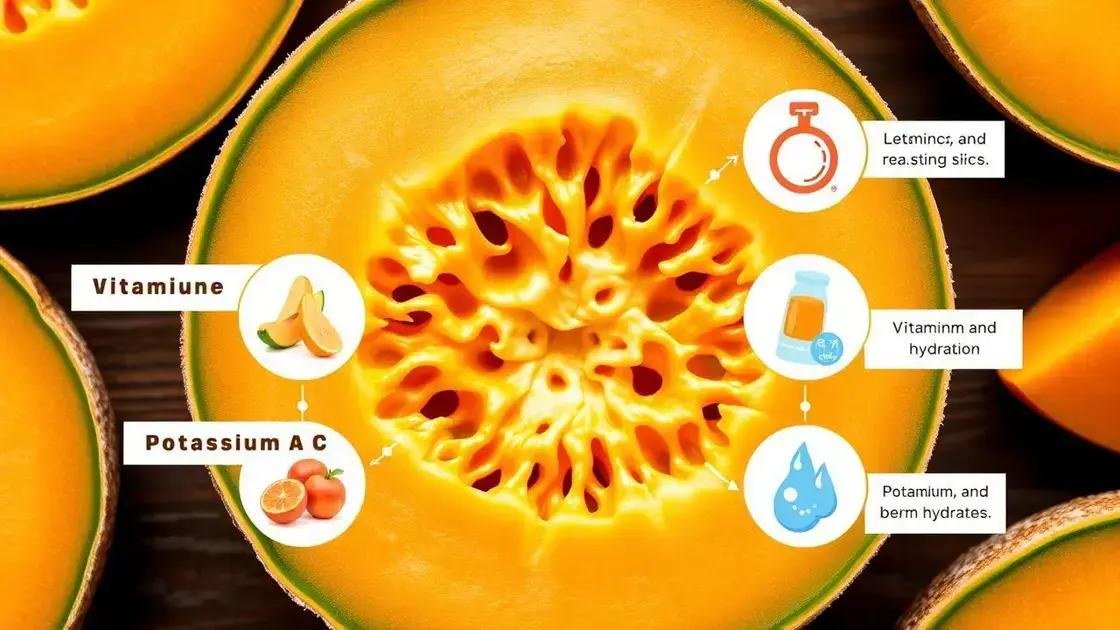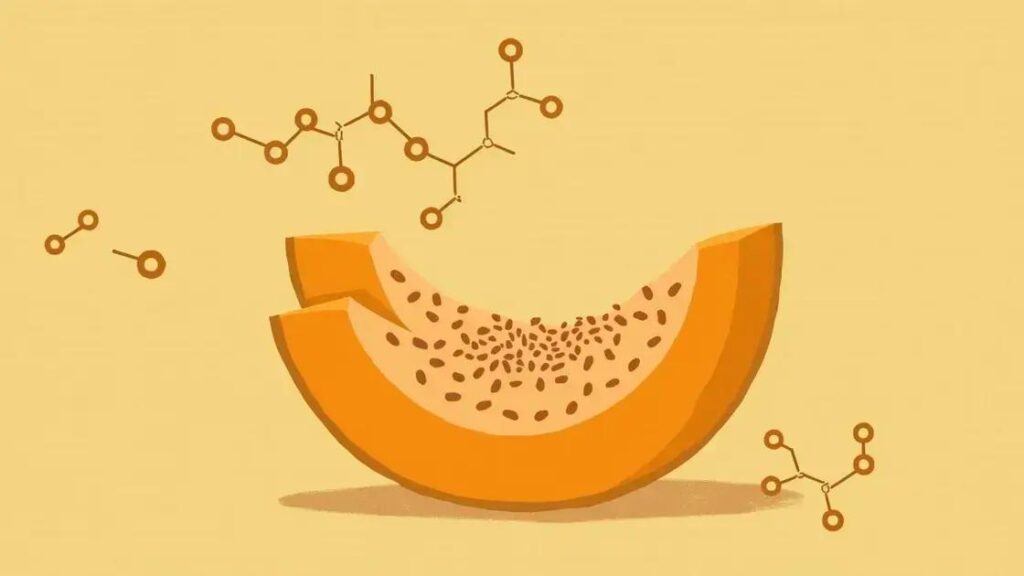Cantaloupe may help support testosterone levels due to its high content of vitamins A and C, antioxidants, and hydration properties. Including this nutritious fruit in a balanced diet can contribute to overall hormonal health and provide a delicious way to enhance your nutritional intake.
Have you ever wondered about the connection between cantaloupe and testosterone levels? This delicious melon is not just refreshing; it may also play a role in hormone health. Testosterone is essential for male health, impacting muscle mass, energy levels, and libido. In this article, we’ll delve into the nutritional aspects of cantaloupe, explore its potential effects on testosterone, and look at scientific studies that investigate this intriguing link. Discover how incorporating this fruit into your diet could benefit your hormone levels and overall wellness!
Understanding Testosterone

Understanding testosterone is crucial for grasping how it influences various aspects of health and wellness. Testosterone is a hormone primarily produced in the testicles in males and in smaller amounts in females in the ovaries. This hormone plays a key role in developing male characteristics, such as muscle growth, bone density, and the maintenance of libido.
As men age, testosterone levels naturally decline, which can lead to symptoms like fatigue, decreased motivation, and diminished sexual desire. It’s important to note that testosterone also impacts mood and energy levels, contributing to overall well-being.
Functions of Testosterone
Testosterone is responsible for many vital functions in the body. It helps to build and maintain muscle mass, supports bone strength, and influences the production of red blood cells. Additionally, testosterone contributes significantly to emotional health, helping to reduce feelings of depression and anxiety.
Optimal Testosterone Levels
Maintaining optimal testosterone levels is essential for both men and women. Normal testosterone levels vary by age and sex, with men typically falling within the range of 300 to 1,000 ng/dL. Women generally have lower levels, ranging from 15 to 70 ng/dL. Regular health check-ups can measure these levels and help identify any potential hormonal imbalances.
Factors Affecting Testosterone Levels
Several factors can influence testosterone levels. Lifestyle choices, such as diet, exercise, and sleep, play a significant role. Stress is another crucial factor that can lead to lower testosterone production. It’s essential to manage stress effectively through relaxation techniques and regular physical activity.
In addition to lifestyle, certain medical conditions and medications can affect testosterone levels. Conditions like obesity, diabetes, and hormonal disorders may lead to lower hormone production, demonstrating the importance of regular health monitoring and discussions with healthcare providers.
Nutritional Profile of Cantaloupe

Nutritional profile of cantaloupe showcases its many health benefits. This delicious fruit is low in calories and packed with essential nutrients. A typical serving of cantaloupe, about one cup or 177 grams, contains approximately 53 calories. This makes it an ideal snack for anyone looking to manage their weight.
Vitamins and Minerals
Cantaloupe is an excellent source of vitamin A, providing over 100% of the daily recommended intake in just one serving. This vitamin is crucial for eye health, immune function, and healthy skin. Additionally, cantaloupe contains vitamin C, which supports the immune system and helps the body absorb iron.
Hydration and Fiber Content
Being about 90% water, cantaloupe is great for hydration. It helps to keep the body hydrated, especially during hot weather or after exercise. Furthermore, cantaloupe contains a moderate amount of dietary fiber, which supports digestive health, aids in maintaining a healthy weight, and helps regulate blood sugar levels.
Antioxidant Properties
Cantaloupe is rich in antioxidants, including beta-carotene and flavonoids. These compounds help fight oxidative stress and may reduce the risk of chronic diseases. Eating foods high in antioxidants can support overall health and wellness.
Minerals in Cantaloupe
This fruit also provides essential minerals like potassium and magnesium. Potassium is important for heart health, as it helps regulate blood pressure and fluid balance. Magnesium plays a role in many bodily functions, including muscle function and energy production.
Impact on Hormonal Health
The nutrient-rich composition of cantaloupe may also positively influence hormonal balance, including testosterone levels. Its vitamins and minerals contribute to overall health, laying the groundwork for hormone production and regulation.
How Cantaloupe Affects Hormones

How cantaloupe affects hormones is an interesting topic, especially when considering its potential influence on testosterone levels. This delicious fruit contains various vitamins and minerals that may help support hormonal balance.
Cantaloupe is rich in vitamin C, which plays a role in the production of testosterone. Studies suggest that adequate vitamin C levels can promote healthy testosterone levels in the body. Additionally, this vitamin acts as an antioxidant, protecting cells involved in hormone regulation from oxidative stress.
Vitamin A and Hormonal Health
Another important nutrient in cantaloupe is vitamin A, known to support the endocrine system. This vitamin can help maintain healthy hormone levels, including testosterone. The body converts beta-carotene, found in cantaloupe, into vitamin A, making this fruit a natural source of this vital nutrient.
Impact of Hydration
Given that cantaloupe is about 90% water, it plays a pivotal role in hydration. Proper hydration is essential for overall bodily functions, including hormone production. When the body is well-hydrated, it can better regulate hormones, contributing positively to hormone health.
Minerals and Hormone Regulation
Cantaloupe also contains minerals like potassium and magnesium. Potassium supports nerve and muscle function, which can indirectly influence hormone regulation. Magnesium is known to impact testosterone levels positively, with studies linking adequate magnesium intake to better hormone profiles.
Dietary Fiber and Hormonal Balance
Rich in dietary fiber, cantaloupe can aid in digestive health, which is closely tied to hormonal balance. Healthy digestion leads to better nutrient absorption, ensuring that the body has the necessary components to produce hormones effectively.
Incorporating cantaloupe into a balanced diet could be beneficial for maintaining healthy hormone levels. Its combination of vitamins, minerals, and hydration properties may support testosterone production and overall hormonal health.
Cantaloupe in a Testosterone-Boosting Diet

Cantaloupe in a testosterone-boosting diet can provide many benefits for those looking to enhance their hormonal health. Integrating this sweet fruit into your meals is simple and enjoyable, making it a great choice for anyone focused on testosterone levels.
The high water content of cantaloupe is helpful for hydration. Staying hydrated is crucial for overall health and can positively impact hormone production. Proper hydration helps the body efficiently produce and regulate hormones, including testosterone.
Incorporating Cantaloupe into Meals
Cantaloupe can be easily included in various meals. One popular way is to enjoy it as a refreshing snack on its own. You can also combine cantaloupe with yogurt or cottage cheese for a nutritious breakfast or snack that fuels your body with essential nutrients.
Adding Cantaloupe to Salads
Another way to enjoy cantaloupe is by adding it to salads. You can create a delicious salad with fresh greens, diced cantaloupe, nuts, and a light dressing. This not only adds flavor but also enhances the nutritional profile of your dish.
Smoothies and Juices
Cantaloupe works wonderfully in smoothies. Blend it with spinach, protein powder, and a splash of almond milk for a delicious and hormone-supporting drink. Smoothies are an excellent way to combine several hormone-boosting ingredients, and cantaloupe adds natural sweetness.
Complementing Other Foods
To maximize the testosterone-boosting benefits, consider pairing cantaloupe with other testosterone-friendly foods. These can include foods high in healthy fats, such as avocados and olive oil, as well as lean proteins like chicken and fish. This combination can create a balanced meal that supports overall hormone health.
Including cantaloupe in your diet is a tasty way to aid in maintaining healthy testosterone levels. Its sweet flavor and rich nutrient profile make it an attractive and effective component of any hormone-boosting eating plan.
Scientific Studies on Cantaloupe and Testosterone

Scientific studies on cantaloupe and testosterone provide interesting insights into how this fruit may influence hormone levels. While research specifically linking cantaloupe to testosterone production is limited, there are studies that suggest its nutrients can play a role in hormonal health.
Cantaloupe contains high levels of vitamins A and C, both of which are essential for the maintenance of healthy hormone levels. Research indicates that vitamin C can impact testosterone production positively. For instance, a study showed that men with adequate levels of vitamin C had improved testosterone levels compared to those with deficiency.
Role of Antioxidants
Additionally, the presence of antioxidants in cantaloupe, particularly beta-carotene, suggests that it may help protect cells involved in hormone production from oxidative stress. Antioxidants can prevent damage from free radicals, which might enhance the function of glands that produce testosterone.
Hydration and Hormonal Balance
Another research area involves hydration. Since cantaloupe is composed of roughly 90% water, studies have shown that adequate hydration is vital for maintaining hormonal balance, including testosterone. Dehydration can lead to reduced testosterone levels, so consuming water-rich foods like cantaloupe may support overall hormonal health.
Related Nutritional Studies
While specific studies on cantaloupe are sparse, some research has linked the intake of fruits and vegetables to better testosterone levels. A diet rich in plant foods, including melons, is believed to contribute to improved hormone profiles. This means cantaloupe could potentially be part of a larger pattern of nutritious eating that benefits hormonal health.
Overall, while more direct studies on cantaloupe and testosterone are needed, its nutrient profile suggests it could have a positive influence on hormonal health when included in a balanced diet.
In Conclusion: The Benefits of Cantaloupe for Testosterone Levels
Cantaloupe offers a wealth of nutrients that may support testosterone levels and overall hormonal health. Its rich content of vitamins A and C, along with antioxidants and hydration properties, all contribute to maintaining hormonal balance.
Incorporating cantaloupe into a balanced diet can provide a delicious way to enhance your nutritional intake while potentially boosting testosterone. Whether enjoyed as a fresh snack, added to salads, or blended into smoothies, this fruit can play a beneficial role in a testosterone-boosting diet.
As research continues to explore the relationship between dietary choices and hormone health, cantaloupe stands out as a tasty and nutritious option worth including in your meals.
FAQ – Frequently Asked Questions about Cantaloupe and Testosterone
What nutrients in cantaloupe may boost testosterone levels?
Cantaloupe is rich in vitamins A and C, antioxidants, and hydration, all of which may support healthy testosterone levels.
How can I incorporate cantaloupe into my diet?
You can enjoy cantaloupe as a fresh snack, add it to salads, blend it into smoothies, or include it in yogurt dishes.
Are there scientific studies linking cantaloupe to testosterone?
While specific studies are limited, existing research suggests that the nutrients in cantaloupe may positively influence hormonal health.
How does hydration affect testosterone levels?
Hydration is crucial for hormonal balance, as dehydration can lower testosterone levels. Cantaloupe’s high water content helps with hydration.
Can eating cantaloupe help with overall hormonal health?
Yes, incorporating cantaloupe into a balanced diet can provide essential nutrients that contribute to overall hormonal health.
What other foods can I combine with cantaloupe to boost testosterone?
Combining cantaloupe with healthy fats, lean proteins, and other fruits and vegetables can create balanced meals that support testosterone production.













